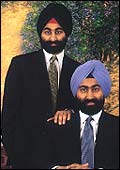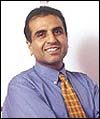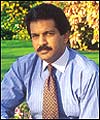|
 |
| Our philosophy is that business must
come before family |
''Not All
Can Run a Firm''
Malvinder and Shivinder Singh
Director, (Global Licensing & Business Development),
Ranbaxy and COO, Fortis Healthcare
After your father's death,
your grandfather, Bhai Mohan Singh, wanted the two of you on the
Ranbaxy board. Why did you choose not to push for that?
Shivinder: Granddad feels that what
has been built by the family must remain in the hands of the family.
But we want to work as professionals. You have to be a player before
being a team leader.
Do you see Ranbaxy as a family business?
Malvinder: Our philosophy is that business
must come before the family. My father was a professional with some
equity interest. But not all family members can run a business.
In that sense, succession should distinguish ownership from management.
Shivinder: At the end of the day, one
has to deliver. But promoters have a better drive to manage a company.
What about your children?
Shivinder: We will bring up our kids
with the same values. Our children are toddlers now. But once they
grow up, they will have to perform, and deliver the goods.
Do you see yourself heading Ranbaxy and
being on the company's board soon?
Malvinder: I believe I have worked my
way up. And I see myself moving up the ladder in order to lead the
company. In what role and designation, I don't know.
 |
|
A promoter's child gets treated as
a promoter even if she joins as a trainee
|
''All For Good Governance''
Sunil Mittal, Group MD,
Bharti Enterprises
You've often been quoted as saying that you
may not pass on your business to your children. Don't you view the
group as a family business?
First of all, there are several other promoters
in Bharti besides the Mittals, like SingTel, Warburg Pincus, International
Finance Corp, Asian Infrastructure Fund, and New York Life Insurance.
Second, the character of the business is not designed to be a family
business. It's run by professionals.
Doesn't the family take all strategic decisions?
We have divided the business into three parts:
operations, management, and governance. I left the operations part
some 18 months back. With age, I will leave the management part
and focus only on governance. It's the hundreds of professionals
we've employed who take strategic decisions.
What if your children want to be part of
the family business?
My children are too young. My daughter is 16
and my two sons are 14. They will choose their own careers. But
if they are keen on joining Bharti, they'll first have to acquire
a professional degree and prove themselves at another company. Then
again, I feel that a promoter's child gets treated like a promoter,
whether she/he joins a company as a trainee or at some senior position.
But by the time my children complete their education, the character
of the Bharti group would have evolved. Our shareholding, which
is at the moment 46 per cent, would have come down.
 |
| The future of family business lies
in its transforming onself into aggressive VCs |
''Competence Matters''
Anand Mahindra, Vice Chairman,
Mahindra & Mahindra
What should be the role played by a family
in a business, and what should be the function of professionals?
It is very clear that the family's role in
a business depends upon both the inclination and the competence
of any particular family member. If a family is truly committed
to maximising shareholder wealth it would be up to it to ensure
that the professional or family member best qualified for a particular
position was installed in that position. But there are certain corporate
level jobs, for example those where a great deal of communication
or pr is required, to which family members do bring in some additional
advantages.
How should a business family go about the
task of creating shareholder value?
The future of Indian business families lies
in transforming themselves into aggressive venture capitalists.
The longer families delay in making the transformation, the more
they will miss out on opportunities to accumulate greater wealth.
What future do you see for the Indian family
enterprise beyond the third generation?
It's simply a matter of increased complexity
of relationships due to the increasing number of participants. As
families expand, if subsequent generations truly carry the entrepreneurial
genes of their ancestors, then they too would hanker to make their
own reputations and satisfy their own entrepreneurial aspirations
by creating their own businesses.
 |
| Family's role lies in assessing opportunities
and allocating the capital |
''Commitment Is Strength''
Harsh Goenka, Vice Chairman,
RPG Group
What role does the family play in the RPG
group?
The strength of family-managed businesses is
its commitment to values. The family plays a key role of inculcating
those values. At RPG, the businesses are run by a top-level management
board comprising both family and professionals.
How has the family's role changed post-1991?
Well, it is just that at RPG, liberalisation
coincided with the group's own restructuring, which happened in
the early nineties. The role of the family is mainly in assessing
the opportunities and allocating the financial resources and the
people resources.
How do you see the RPG group evolving in
the years ahead, given that studies show that family businesses
rarely survive the third generation?
The group in its new identity began only around
1980. It is still very young.
What has the RPG group done to promote fairness,
transparency, and accountability?
The RPG group was amongst the first to implement
a detailed corporate governance policy two years back. We have also
put in place the 'RPG Values', which is fundamentally a code of
conduct for businesses across the group. We are addressing the issue
of inter-corporate investments in a very serious manner. Transparency
is a journey and we are well on our way.
|

